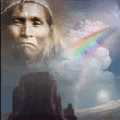232 - Fuego y arena
232 - Feuer und Sand
232 - Fire and Sand
NARRADORA El hombre blanco extendió su dinero sobre el piso.
NARRATOR The white man spread his money on the floor.
Esa cantidad pagaría por las tierras del pueblo hopi.
That amount would pay for the Hopi people's land.
NARRADORA El jefe indio, el más anciano de los hopi, tomó un puñado de barro entre sus manos.
NARRATOR The Indian chief, the oldest of the Hopi, took a handful of mud in his hands.
Lo amasó, hizo una bola y la puso al fuego.
He kneaded it, made a ball and put it on the fire.
El barro no se quebró.
The mud did not break.
Entonces, el anciano le dijo al hombre blanco:
Then the old man said to the white man:
ANCIANO Ahora, dame un puñado de tu dinero.
OLD MAN Now, give me a handful of your money.
Lo voy a poner junto al barro, sobre el fuego.
I'm going to put it next to the mud, over the fire.
BLANCO ¿Y para qué quieres hacer eso?
WHITE And why do you want to do that?
ANCIANO Lo que antes se queme será lo que tenga menos valor.
ÄLTERER Was vorher brennt, ist am wenigsten wertvoll.
OLD MAN What burns first will be what has less value.
VIEUX HOMME Ce qui brûle en premier aura moins de valeur.
NARRADORA El hombre blanco reaccionó horrorizado...
NARRATOR The white man reacted in horror ...
BLANCO Mi dinero se quemará antes… El dinero es de papel.
WHITE My money will burn before… Money is paper.
NARRADORA Entonces, el jefe indio sacó una pequeña bolsa de piel y la llenó de arena.
NARRATOR Then the Indian chief took out a small leather bag and filled it with sand.
BLANCO Y ahora, ¿qué haces, qué quieres?
WHITE And now, what are you doing, what do you want?
ANCIANO Toma esta bolsa y dame el dinero con el que quieres comprar nuestras tierras.
OLD MAN Take this bag and give me the money with which you want to buy our land.
Yo lo voy a contar mientras tú cuentas los granos de arena.
I'm going to count it while you count the grains of sand.
BLANCO Pero...
WHITE But...
ANCIANO Lo que antes se cuente, será lo que tenga menos valor.
OLD MAN What is counted before, will be what has less value.
NARRADORA El hombre blanco tomó la bolsa, vertió la arena en la palma de su mano y mientras la contemplaba dijo:
NARRATOR The white man took the bag, poured the sand into the palm of his hand and while looking at it said:
BLANCO Estás loco, indio viejo.
WHITE You're crazy, old Indian.
Yo no tendría tiempo ni en toda mi vida para poder contar esta arena.
I wouldn't have time in my whole life to be able to count this sand.
Tú, en cambio, vas a poder contar rápidamente mi dinero.
You, on the other hand, will be able to quickly count my money.
ANCIANO Quiere decir... que nuestras tierras tienen mucho más valor que esos papelitos que tú llamas dinero.
OLD MAN It means... that our lands have much more value than those pieces of paper that you call money.
ANCIANO Nuestras tierras no serán consumidas por las llamas.
OLD MAN Our lands will not be consumed by flames.
LE VIEIL HOMME Nos terres ne seront pas consumées par les flammes.
Mientras brille el sol y dance el viento, mientras corra el agua y en las noches las bañe de plata la abuela Luna, estas tierras estarán aquí y darán vida a los hombres y a las mujeres hopi, a los animales y a las plantas.
As long as the sun shines and the wind dances, as long as the water runs and grandmother Luna bathes them in silver at night, these lands will be here and will give life to Hopi men and women, animals and plants.
BLANCO Sí, pero… mi dinero… con mi dinero puedo...
WHITE Yes, but... my money... with my money I can...
ANCIANO No queremos tu dinero.
OLD MAN We don't want your money.
Nosotros no podemos comprar ni vender la tierra, porque ella es nuestra Madre.
We cannot buy or sell the earth, because she is our Mother.
El Gran Espíritu la puso aquí para nosotros.
The Great Spirit put her here for us.
La tierra es la fuente de la vida.
The earth is the source of life.
Y la vida no tiene precio.
And life is priceless.
NARRADORA Al escuchar esto, el hombre blanco tomó su dinero y se fue por donde mismo había venido.
NARRATOR Upon hearing this, the white man took his money and left the same way he had come.

